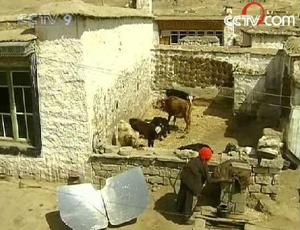China
Tibetan countryside enjoys rapid economic growth
WATCH VIDEO
Source: CCTV.com | 04-05-2008 08:38
Special Report: 3.14 Tibet RiotsIn 1959, the serf system was put to an end after ruling Tibet for more than a thousand years. Since then, development has been the region's main theme.
 |
| Tibet's economy has seen rapid growth. (CCTV.com) |
Especially over the past 15 years, Tibet's economy has seen rapid growth. Our reporter visited a village not far from the regional capital of Lhasa to find out about life there.
Wang Xin, Tonga Village, Lhasa, said, “After half an hour’s drive from Lhasa, I now come to this small village. 95 percent of its residents are Tibetan. And I’m going to visit an old Tibetan couple who have lived here throughout their lives.”
For 82-year-old Puncog Drolkar and her husband, life has been like this for years. Slow and serene, everything is in line with Tibetan traditions.
For this couple, change seems unimaginable. Having suffered terrible hardships early on in life, they’re just fine with what they have now.
Half a century ago, Drolkar was a serf, the Tibetan form of slaves. She remembers the days when her owner treated serfs as “talking animals”. Her paralyzed finger is a constant reminder.
Puncog Drolkarm Tonga Village, Lhasa, said, “The serf owner would hide his whip inside the sleeves of his robes.
As I was working, he whipped my finger out of joint. I could do nothing but go back to my bunker just to get some water.”
Now Drolkar has some real animals. She also has a piece of farmland to call her own and her house was provided free by the government.
These days, the couple have enough food to eat. She told me that, compared with the old times, life now is very good.
She said she feels just like “someone who has been pulled out of the mud”. But that doesn’t mean her life is without worries.
Puncog Drolkarm Tonga Village, Lhasa, said, “Frankly, life now could not be better. We are happy. But recently, some people have been causing some trouble. We are a bit concerned.”
Drolkar was referring to the riots in Lhasa about three weeks ago. Also concerned is her grandson-in-law, a Han Chinese.
Zhang Yonggang arrived in Tibet from neighboring Sichuan Province and, 13 years ago, married a Tibetan girl, Dawa Drolkar.
Zhang Yongang, Quarry Owner of Tonga Village, Lhasa, said, “Those people with ulterior motives don’t want to see us living good lives. There are so many preferential policies. Why did they do such things? They shouldn’t have. They really shouldn’t have.”
Zhang runs a quarry factory nearby. Like most of the villagers, he built his new house thanks to a large government subsidy.
He has a car and a truck, but that’s nothing special, he told me, “sixty percent of the villagers have cars.”
The couple has two daughters, with one away at school. Both are registered as Tibetan, because Tibetan children enjoy schooling and health care, completely free.
Dawa Drolkar, Zhang Yonggang's Wife, said, “Now our lives are so good. The state gave us so much money to build our new house. The riots are pointless.”
As one of the few Han Chinese living in the village, Zhang said he doesn’t feel like an outsider at all.
The Han Chinese came here and local people’s lives got much better, he said, so the Tibetans like them a lot.
Editor:Zhang Pengfei



